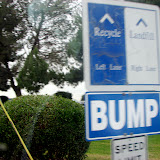I was talking to Drs. Reckmeyer and Fried the other night about the gap between the core and periphery countries. One of the things Reck always says is that we need to close the gap between the two groups for humanitarian and security reasons. Dr. Fried pointed out that in any arrangement, the core needs the periphery to be more inventive, while the periphery needs the core to hold on to traditional approaches, so that there can be realistic give and take between change and stability.
So, I was reading the internet like my grandfather must have read his morning newspaper when I came across this
essay about how to improve Manila by Patricia Faustino. I thought this was a really great thing. The World Bank had an essay contest about improving a city. Local people responded with great ideas. These ideas are on the internet for me, and presumably for the agents in the Philippines with the power to make a difference, to think about. Maybe knowing the international community is listening to these ideas will further affect them.
But more than that, I think Faustino's essay connects to what we were talking about the other night. And what Hash wrote about
here in response to an article saying Africans don't need or deserve computers. His response to the rest of his community was, "Try this on for size: as an African, you are more of an expert on what your part of Africa needs than any self-prescribed expert from the west." Bill Thompson even wrote a thoughtful response, agreeing with Hash about the need for Africans to speak for Africa.
Its not just that peripheral solutions are better for peripheral problems because its a convenient way of avoiding personal responsibility. Certainly, I don't have the tools or the experience to know what a child in southeast Asia or sub-Saharan Africa needs or wants. But its not like we're all so different that if it came down to it, I couldn't come up with some ideas, however culturally inappropriate.
Really, they're better because they demonstrate who is responsible for the community. If a western construction crew showed up and built everything before Faustino had a chance to imagine it, it would be very unsatisfying. Winning a World Bank essay contest is far more fulfilling to the individual and community. Had the construction crew simply showed up, no one would have bought into the idea of public space, which would have then perhaps been destroyed. And, it would have pissed off well-intentioned donors in the west. Faustino's point about how important it is for citizens of Manila to imagine a better world is really well put.
Moreover, the core needs these frontier ideas in and of themselves. Not for humanitarian reasons or to empower the voiceless, but for the genuine betterment of everyone. These problems challenge core communities to put their best efforts towards something other than stagnation and decadence.
